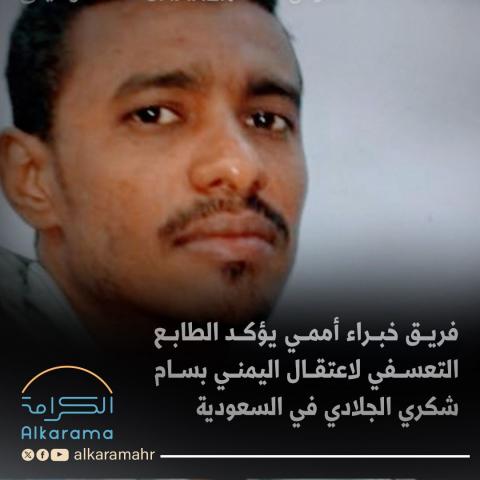
On 30 May 2025, the United Nations Working Group on Arbitrary Detention (WGAD) issued Opinion No. 37/2025, concluding that the detention of Bassam Al Jalladi, a Yemeni national detained in Saudi Arabia since 2019, is arbitrary.
This Opinion follows proceedings initiated in May 2024 by Alkarama, after the victim’s family approached the organization due to several years without effective legal remedy.
Background of the case
On 27 May 2019, Bassam Al Jalladi was arrested in Al Mahra, Yemen, by military forces without being informed of the reasons for his arrest or the existence of any warrant. After being detained in a local military prison, he was transferred to Saudi Arabia in early June without any legal procedure without a judicial decision and without his relatives being notified.
He was then detained at Abha prison in the south of the country, before being transferred in 2022 to Dhahban central prison in Jeddah. During his first months of detention, he was completely cut off from the outside world. It was not until September 2019 that he was allowed to make his first phone call. Contact with his family was then limited until it completely ceased in October 2022. Since that date, his relatives have had no news of him.
In June 2022, three years after his arrest, Mr. Al Jalladi appeared for the first time before the Specialized Criminal Court, an exceptional jurisdiction established and controlled by the Ministry of Interior. It was then that he discovered he was being prosecuted for alleged membership in a terrorist organization — the same charges for which he had been arrested in Yemen in 2016, before the Yemeni judiciary cleared him and closed the case in 2019. He was sentenced to 36 years in prison.
Alkarama submits the case to the UN Working Group
In the proceedings before the UN, Alkarama requested an opinion detailing the numerous violations suffered by Mr. Al Jalladi, both during his arrest and throughout his detention. In particular, Alkarama emphasized the absence of legal procedures surrounding his transfer to Saudi Arabia, his incommunicado detention, the lack of legal assistance, and the fundamentally unfair nature of his trial.
In its response to Alkarama’s complaint, the Saudi government denied any wrongdoing, asserting that Mr. Al Jalladi’s arrest in Yemen and subsequent transfer to Saudi Arabia were carried out in accordance with the law, that he had been informed of his rights, and that he had received a fair trial.
However, the UN Working Group upheld Alkarama’s complaint and accepted its observations, finding that Mr. Al Jalladi had no access to a lawyer for three years, that his trial was held before a court whose independence is disputed and that the charges against him were based on vague and unstable legal grounds.
Recognition of the arbitrary nature of the detention
In its Opinion No. 37/2025, the Working Group concluded that Mr. Al Jalladi’s detention was arbitrary, lacked any legal basis, and violated fundamental rules of international law, including the right to a fair trial. This engages the responsibility of both Saudi Arabia and Yemen.
In response to Alkarama’s requests, the UN experts urged the immediate release of Bassam Al Jalladi, the provision of adequate reparations, and the initiation of an independent investigation into the circumstances surrounding his arrest and detention. The Working Group also reaffirmed the absolute prohibition of extrajudicial transfers between States without judicial safeguards, even when conducted under the guise of security cooperation.
Broader context and call for cooperation
In its Opinion, the Working Group rightly emphasized that during its 34 years of existence, it has demonstrated that Saudi Arabia has systematically violated its international human rights obligations in more than 75 documented cases.
The experts expressed deep concern at a situation they consider indicative of a deeply rooted and widespread problem of arbitrary detention in the country, constituting a serious and persistent violation of international law.
In light of these repeated and troubling failures, the Working Group reiterated its urgent request to carry out an official visit to Saudi Arabia (requests renewed on 24 August 2021 and 4 February 2022), emphasizing the need for constructive dialogue with the Saudi authorities to support them in implementing concrete measures to end these serious human rights violations linked to arbitrary deprivation of liberty.
